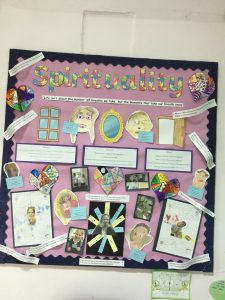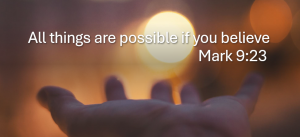Spirituality
![]()

Spirituality is about personal values. Those core principles or standards of behaviour, and our judgement of what is important in life. At the heart of them must be love, compassion, respect and belief, for they weave through all understanding of spirituality. What these values are, is for you to decide, for values belong to us both as individuals and a group or community. We absorb them into ourselves, and we own them.
By being spiritual, we are exploring feelings, beliefs and our experiences. We respect all faiths and values, and enjoy learning about ourselves, others and the world around us. At Mottram, we use our imagination and creativity, and enjoy time to reflect.
How is Spirituality Nurtured at Mottram?
Children’s spiritual development is fostered through all aspects of our provision. It is about the relationships and the values that we consider to be important, as well as the development of knowledge, concepts, skills and attitudes. We give children opportunities to:
- Express personal beliefs and compare views with others, sharing feelings and opinions through discussions and stories.
- Begin to develop their own system of beliefs which may or may not include religious beliefs.
- Experience a love of learning through rewarding their enthusiasm and by encouraging exploratory play and learning.
- Reflect upon the world around them and show a sense of awe and wonder towards aspects of the natural world or human achievement.
- Reflect on the situations of others through role play, stories.
- Experience a range of stories, music, art, drama and dance.

WINDOWS: giving children opportunities to become aware of the world in new ways; to wonder about life’s ‘Wows!’ (things that are amazing) and ‘Ows’ (things that can challenge us). Within this, children are learning about life in all its fullness.

MIRRORS: Learning from Reflections. ‘Learning from life’ by exploring their own insights and perspectives, and those of others. These are opportunities for children to look inward and reflect on their experiences, to consider some of the life’s BIG questions and consider some possible answers. To explore their own insights and those of others.

DOORS: Putting thoughts and ideas into action: and becoming Inspiring Change-makers and Courageous Advocates. Children ‘learn to live by putting into action what they believe’. There are opportunities for children to respond, to DO something, to go through the ‘door’ of a creative expression of their own thoughts and convictions. The aim is to develop and nurture children who have the confidence to truly believe that they can make a difference in the world.
What is the Role of the School Community?
All members of the school community have a responsibility for helping to nurture children’s spiritual development.
School staff can do this through:
- Establishing and maintaining a partnership between pupils, parents and staff; recognising and respecting the faith background of the children and their families;
- Taking part in, and supporting, collective acts of worship;
- Being good role models in their conduct towards other members of the community;
- Promoting an attitude of respect for other people and for others’ views;
- Nurturing consideration for and generosity towards others.
- Drawing on the experiences of pupils and their families during religious education lessons and beyond;
- Recognising and being constantly aware of the needs and backgrounds of each individual pupil;
- Being willing to develop their own knowledge and understanding of the Christian faith and the faiths of others;
- Having a positive attitude to the value of spiritual education.
Pupils can do this through:
- Taking an active part in acts of collective worship;
- Participating in activities which promote the skills allowing them to engage in examination of and reflection upon religious belief and practice;
- Conducting themselves towards others considerately, in line with the code of conduct;
- Respecting the views and beliefs of others.
Parents can help through:
- Adopting a positive attitude to the value of spiritual education;
- Supporting the school’s Christian ethos and acts of community worship such as assemblies and church services;
- Respecting the views and beliefs of others.
Spirituality Backpacks
Hello, we are the Ethos Team at Mottram. We have put together a spirituality backpack for everyone at school. We take this outside at lunchtime for people to explore. They have written prayers, made crosses from playdough, played with the hearts and completed different activities.

Links with St George’s
At St George’s, we recognise that spirituality encompasses so many elements and the windows, mirrors and doors approach help shape our thinking and reflecting in our Collective Worship, Religious Education and across all other areas of the curriculum. Our values, Forgiveness, Friendship, Honesty, Hope, Truthfulness, Love and Compassion, give us the opportunity to reflect and respond to new ideas as well as embed current thinking and to think differently or in a new way. ‘Windows, mirrors and doors’ allow us to see how these values influence our responses as we learn about difficult and often painful times as well as wonderful and remarkable things, and how we can all make a difference to those around us and in the wider world.
Sharing Collective Worship at Mottram has helped us reflect on our own spiritual journey and it was lovely to be able to share our ideas and approaches. The children and staff were extremely receptive and made us feel very welcome and very proud of ourselves. Yellow class talked to us about our children and asked about the different faiths we have in our school and how this helps us live and learn together. We also talked about our values and how they help us grow and learn to make the right choices. Connecting with others and asking questions helps us reflect on who we are and our place in the world.
Our aim is to develop a love of learning and curiosity about the world but also to learn how to love ourselves and other people and for this learning to continue throughout our whole lives.

Spirituality is not a word, nor a feeling – it’s about the whole. We want our children to feel like they belong first and foremost. It is only when they feel safe that they will feel comfortable enough to have the thought provoking moments, to stop and listen, to allow themselves to feel the excitement, the awe and wonder. It is our responsibility to give the children the experiences within school to allow this to happen.
